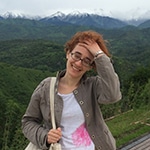Serebro (“silver”; the band’s name is Russian but spelled in the Roman alphabet even in Russian contexts) is a girl pop group that was founded by producer Maksim Fadeev in 2006. Fadeev is a producer on the TV show Star Factory (Фабрика звёзд), the show that also led to the creation of Fabrika and Korni, and in the second season he met participant Yelena Temnikova (Елена Темникова). The two began to work together after the show, in 2005, and together created Serebro. The other two original members were Olga Seryabkina (Ольга Серябкина), a professional ballroom dancer and backing vocalist for Russian-Georgian singer Irakli at the time, and Marina Lizorkina (Марина Лизоркина), who had been a singer for the group Formula.
The group rose to fame in an unusual way—by participating in the 2007 Eurovision Song Contest with their song “Song #1,” even though they were almost completely unheard of at the time. The finals of the contest constituted the group’s first public appearance; they came in 15th place overall, but third place by the audience vote. They became popular all over Europe after that and started releasing new music in both Russian and English, including a Russian-language version of “Song #1” (“Песня №1”). They began winning music awards almost immediately. Their first album, OpiumRose (ОпиумRoz), was released in 2009.
As often happens with pop groups, the original members started to leave after a few years. Lizorkina left in 2009 and Temnikova left in 2014; after several other changes in lineup, the band now consists of Seryabkina, Polina Favorskaya (Полина Фаворская), and Yekaterina Kishchuk (Екатерина Кищук), who joined only this past May. The group in its variou sincarnations has released three albums in total, and they have already released two new singles, “Chocolate” (in English) and “Broken” (“Сломана”), with its current lineup.
The group has been criticized for its odd mix of styles, some fairly typical English-language pop/dance music and some lyrical ballads designed to appeal more to Russian audiences. The group’s website highlights its diversity of style, calling it one of the secrets of the group’s success and popularity.
“Song #1” (“Песня №1”), the Russian-language version of Serebro’s Eurovision breakout:
Lyrics for “Песня №1”:
Послушай меня
И всё, что я тебе говорю – не верь
(А-ха-ха)
Никогда мне не верь
Эти тихие слова,
Что ты мне говорил
Я не верила тебе
Поэтому ты был
Эта нежная любовь
Похожая на Е
Ты пытаешься,
Но я
Забыла о тебе!
Молчи
(Молчи)
Я не буду с тобой
Молчи
(А-ха)
Я про тебя забуду
А-у.
Девчонки ями-ями
Следите за краями
Но попадает в кровь
Ля-мука любовь
А-у.
Девчонки кто-то сзади
Подумал, что мы кошки
Но попадает в кровь
Ля-мука любовь
Пока, до встречи,
(Ха)
Пока, до встречи,
(Ха)
Пока, до встречи,
И в кровь
Ля-мука любовь
Пока, до встречи,
(Ха)
Пока, до встречи,
(Ха)
Пока, до встречи,
И в кровь
Ля-мука любовь
(А-ча)
Ничего не говори
А просто уходи
Я не знаю, что потом
И что там впереди
Эта нежная любовь
Похожая на Е
Закружила у тебя
И закружила мне
Молчи
(Молчи)
Я не буду с тобой
Молчи
(А-ха)
Я про тебя забуду
А-у.
Девчонки ями-ями
Следите за краями
Но попадает в кровь
Ля-мука любовь
А-у.
Девчонки кто-то сзади
Подумал что мы кошки
Но попадает в кровь
Ля-мука любовь
Пока, до встречи,
(Ха)
Пока, до встречи,
(Ха)
Пока, до встречи,
И в кровь
Ля-мука любовь
Пока, до встречи,
(Ха)
Пока, до встречи,
(Ха)
Пока, до встречи,
И в кровь
Ля-мука любовь
Я постараюсь тебя забыть
Всё может быть или же не быть
Я прикоснулась к твоим губам
И я тебя забыла
А-у.
Девчонки ями-ями
Следите за краями
Но попадает в кровь
Ля-мука любовь
А-у.
Девчонки кто-то сзади
Подумал что мы ..(а-хааа)
Но попадает в кровь
Ля-мука любовь
Пока, до встречи,
(Ха)
Пока, до встречи,
(Ха)
Пока, до встречи,
И в кровь
Ля-мука любовь
Пока, до встречи,
(Ха)
Пока, до встречи,
(Ха)
Пока, до встречи,
И в кровь
Ля-мука любовь
“Broken” (“Сломана”), the group’s newest single, showing the other side of their musical style:
Lyrics for “Сломана”:
На расстоянии я не увижу.
Но я пытаюсь всё изменить.
Где-то ответы, но задыхаюсь.
Нашу любовь мне не переплыть.
Еще один день и я не закричала.
На рассвете, что нет тебя.
Но еще один день и я знаю причалы.
Падали падали к звездам.
Может быть, может быть поздно.
Сломана, сломана к тебе моя любовь.
Надо ли, надо ли, это прячется, прячется где-то.
Сломана, сломана к тебе моя любовь.
Падали падали к звездам.
Может быть, может быть поздно.
Сломана, сломана к тебе моя любовь.
Надо ли, надо ли, это прячется, прячется где-то.
Сломана, сломана к тебе моя любовь.
Моя любовь…
И без касания я всё услышу.
Можно мне вечность столько любить.
Рядом с тобою я всегда тише.
Я так хотела все повторить.
Еще одна ночь и я просто молчала.
На закате тебя любя.
Но еще одна ночь и я не понимала.
Падали падали к звездам.
Может быть, может быть поздно.
Сломана, сломана к тебе моя любовь.
Надо ли, надо ли, это прячется, прячется где-то.
Сломана, сломана к тебе моя любовь.
Падали падали к звездам.
Может быть, может быть поздно.
Сломана, сломана к тебе моя любовь.
Надо ли, надо ли, это прячется, прячется где-то.
Сломана, сломана к тебе моя любовь.
Моя любовь…
“Song #1” at Eurovision 2007:











